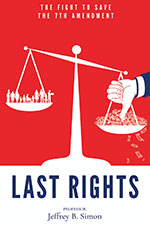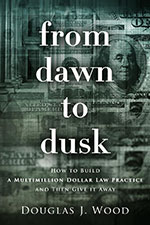 Verdict: It’s a Keeper
Verdict: It’s a Keeper
Last Rights: The Fight to Save the 7th Amendment
By Jeffrey B. Simon (Pittsburgh, PA: Dorrance Publishing Co., 2023). 186 pgs. $18. Order, www.amazon.com.
Reviewed by Elizabeth McIntire
Professor Simon writes about his experiences as a plaintiff’s lawyer in Last Rights, with the lens of informing readers about their Seventh Amendment right to a trial by jury. He provides a thorough and searing review of how American consumers are routinely harmed by profit-seeking interest groups and companies through misleading marketing tactics, self-serving legislation, and deceitful litigation. The book offers a unique perspective into consumer-focused litigation like that involving mesothelioma, opioids, and, of course, hot coffee.
One of my favorite parts of this book is the perspective Simon brings from his years as a plaintiff’s lawyer. He starts every chapter with “Every experienced Plaintiff’s lawyer…” or “Every passionate Plaintiff’s lawyer….” He was able to tie all the issues he described to his work in the field. The problems he describes include arbitration clauses, the opioid crisis, and more.
This book is an easy and enjoyable read. Simon balances personal anecdotes with supporting evidence. The only thing missing was the connection between the stories and evidence to the right to a jury trial – the right found in the Seventh Amendment.
This book would have been more effective if it was focused on what Simon believed were the issues most affecting American consumers, based on his experiences. I enjoyed the discussion about the Seventh Amendment rights, but it was not developed throughout the entire book. There were some chapters in which the Seventh Amendment was barely mentioned. There were parts where the connection to the Seventh Amendment was, at best, tenuous. Nevertheless, I felt Simon was the exact person I wanted to listen to about the importance of the Seventh Amendment.
I loved the perspective he gave to the issues that American consumers face today. It was an excellent insight into his profession. He even included a moving and captivating opening statement in a case he tried against Johnson & Johnson.
As a recent law school graduate, I can bet Professor Simon gets excellent reviews from his students. This book entertained me the entire time. The book was long enough to get a lot of good information but not so long as to be overdone.
Elizabeth McIntire, U.W. 2024, practices with Phillips Law Group LLC, Madison.
 Verdict: Touchdown!
Verdict: Touchdown!
From Dawn to Dusk: How to Build a Multimillion Dollar Law Practice and Then Give it Away
By Douglas J. Wood (Plum Bay Publishing LLC, 2024). 155 pgs. $16.99. Order, www.amazon.com.
Reviewed by Laurel Montag
As a third-year associate, I have received a bounty of advice, much of it solicited, and some unsolicited, about how to succeed as an attorney: “always do X”; “never do Y”; “network, network, network”; “make yourself known, but don’t cause any controversy!” The list goes on. Navigating the ins and outs of private practice is a unique beast in and of itself, on top of learning how to practice law “for real.” Canned, generic advice, I have found, is not a useful compass on this journey.
What I appreciate about From Dawn to Dusk: How to Build a Multimillion Dollar Law Practice and Then Give it Away is that author Douglas J. Wood offers practical steps, examples, and anecdotes along with his proffered advice. This book truly feels like a “how-to guide” but not in the way you might expect. As the title suggests, the book is separated into two main sections: dawn and dusk. “Dawn” refers to a lawyer’s process of building a multimillion-dollar law practice, and “dusk” encapsulates passing on a practice and winding down as retirement approaches.
Dawn: The first portion of the book is full of tangible advice for attorneys building their practice, breaking down the realities of practice you don’t learn in law school such as how to use your law firm’s compensation formula to your advantage, how to effectively (and realistically) network, and how to evaluate and reevaluate your own habits and performance. The aspect that separates this book from the pack, however, is Wood’s underlying theme: integrate yourself into your practice. Wood offers that, by taking a genuine interest in your work, your clients, and your coworkers, your career will flourish. Importantly, Wood provides examples of how to implement this strategy while maintaining healthy boundaries.
Dusk: Although I am years away from retirement, I will get to that stage one day. Wood eloquently describes a phenomenon in private practice that most lawyers are ill-prepared for: becoming irrelevant. Harsh sounding, I know, but as Wood puts it, “[v]ery few law firms pay any attention to planning for the retirement of … older lawyers beyond getting them to transfer clients to others.” Wood came to this realization later than he would have liked. In this section of the book, Wood provides lessons learned, and not learned, as he navigated this transition. Somewhat unexpectedly, the lion’s share of “Dusk” speaks less to the mechanics of end-of practice planning and instead addresses factors such as stress, disappointment, humor, and leadership. The book also includes helpful appendices with forms and guides to use when implementing Wood’s strategies.
Overall, From Dawn to Dusk was an insightful and refreshing take on how to build, maintain, and pass on a successful practice, all while remembering one vital point: Your career does not define you; you ultimately control how you define yourself. Whether and how much your career is part of that definition is up to you.
Laurel C. Montag, Marquette 2022, is an associate at DeWitt LLP, practicing in mergers and acquisitions and intellectual property.
Want to Review a Book?
Please request a book and writing guidelines from the Wisconsin Lawyer managing editor at wislawmag@wisbar.org. Reviewers may keep the book reviewed. Reviews of about 500 words are due within 45 days of receiving the book. Reviews are published, space permitting, in the order received and may be edited for length and clarity.
» Cite this article: 97 Wis. Law. 56-57 (December 2024).
